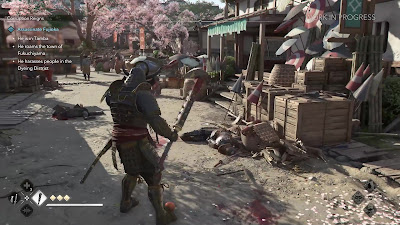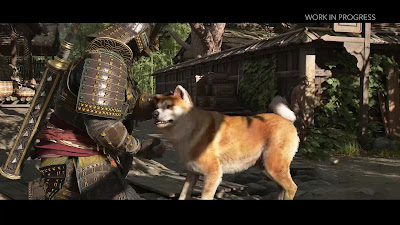It was in the bamboo forests where I first heard the nostalgic screech of a katana. Ever since, I have been in pursuit of Assassin’s Creed Shadows. This game stands out from the rest, elevating the entire notion of action games by infusing history along with emotion and skilful storytelling in its plot. As a hardcore gamer and an adventurist, I always seek out a game that inspires me internally, and controls make me appreciate action-adventure games. My whole being was immersed in the medieval period of Japan, which, as a gamer passionate about stories, I have always desired to traverse. With the aid of the game, I wasn’t solely given a location but rather elevated to Japan, allowing me to breathe in its culture and traditions alongside the myriad changes that were so palpable yet composed under the surface.
Stepping into the Scroll: A Narrative Journey Through Feudal Japan
It’s remarkable how far Ubisoft’s creativity went with the storyline for Assassin’s Creed Shadows. My full immersion into the world of the game started the moment I walked into the village. It was not only my sight that was captured, but rather my entire being. From the many warmly animated merchants providing explanations to monks strolling through, chanting their mantras, the life of the village occupied my senses. Rather than a bland and lifeless backdrop, it became vibrant and multifaceted. While having an impact and being impacted by engaging AI—a successful albeit carefully unmasked shift in this game, I felt in my bones everything came to life—not programmed sequences, but actual spontaneous moments that augmented reality.
While running across the tiled rooftop, I remember seeing a farmer who was also looking at me. It seemed as if time had paused. As I transformed into a shadow behind an old temple, I was no longer in command of my own life. To me, it felt like awakening, relentless bursts of animated moments merging together, and celebrating existence within nothingness. The understanding that I was a fleeting spirit, a waft of “nothing,” and feeling intangibly real almost simultaneously was a manifestation waiting to explode at any moment.
Unraveling the Threads of Destiny: Character, Conflict, and Historical Resonance
Instead of focusing on geographical aspects, Assassin’s Creed Shadows portrays the area’s humanity, alongside Sasakawa’s riveting and puzzling tale. What captured me the most and engrosses me the most is the history surrounding Yasuke. It is the backdrop that makes sense of everything and is not an irrelevant detail to be overlooked. Each character’s history is intertwined and riddled with a never-ending saga of conflict, because looking at history as a living being gives so much more than its lifeless body. Tradition’s birth pains, the reverberating remnants of ancient hostility, and the fog of aspirations yet to be cradled all push the story onward in ways which are concrete, not vague. Some character arcs were so heavy that I found it hard not to empathize with the contrasting force that the character undergoes, which makes the viewer ponder where they end up going.
The Call and the Maze: The Open World Embrace
To fulfill my needs as a narrative-first gamer, I must reap the benefits of an open world experience. The main story in Assassin’s Creed Shadows, as well as the side quests, are equally captivating. Each offering something tantalizing: Every other moment, whispers from NPCs, visual hints, or distant shines capture my attention. I physically want to pursue the journey, but my heart is being pulled elsewhere. “Oh, the main quest can wait a moment,” I tell myself, momentarily reasoning. “If I assist these courteous farmers and dismantle some bandit encampments to restore order, it will lift my spirits.” Such side quests exemplify the nature of engaging tangential pursuits.
Instead of fetch quests, here the players get a glimpse into the culture and politics of the period. This practice helps players who buy PS5 games by changing things a lot, transforming what would otherwise be dull into rich, captivating lore and commendable character development. It is not easy balancing the main story with sideline plots, but in Shadows, Assassin’s Creed manages to pull this off elegantly, where even the sidetracks are central to the primary experience.
Technical Issues, A Sense of Reality, Immersion Beyond Reality
It is strange that storytelling captures attention while other elements go unnoticed, but this is the reality that folks face every day. Assassin’s Creed Shadows, like most titles, offered a licensed soundtrack. I noticed right away that my PlayStation 1 was suffering from some early crashes in the first few hours of play. My console appeared broken, while most other games seemed to be experiencing phantom limbs. With the device unplugged from the internet, my “digital ‘umbilical cord'” suffered strangulation and was free.
The map’s opening sparked moments of stillness, and immersive moments in the game, riding and shedding character models like a saddle every moment or so was strange, as was needing to perform two “final” kills so an enemy didn’t simply take a nap. But swaying imperfections aside, my immersion in the story and its world has always been ludicrously never disrupted. Progressing in the story had no bugs or annoying dead ends that paused forward movement. Considering how massive and intricate this game is, the polish and overall stability were remarkably commendable.
The small grievances felt like an extraordinary effort to restore a slice of reality. The small slip-ups within the narrative, almost like voice parameters combined with uninvited sound effects, returned me to my place. None of these complaints mattered to me because the feeling alone was so captivating, and made everything feel shaky in a good way. I guess I could say I was tethered to the framework because there is no way one could try to claw at the edges, rough as they may be, scratch enough to different segments that remove the fact that these flashes have glimpses hinting at stories deserving of being shared.
A Story to Which One Relates or Reflects Upon
As I was playing the last sequence of Assassin’s Creed Shadows, I remember feeling a strange combination of warmth and heartbreak because the story had no closure. It is more than a mere game; it is an experience, a historical moment that is felt and lived deeply. It is something that resonates where the heart wishes to rest.
As someone who defends video games as works of art comparable to novels or films, this particular video game would best demonstrate my point. A scene would unfold to evoke dramatic silence where a character would reflect, witness grave injustices, or celebrate hard-earned triumphs. These would describe situations to evoke strong emotions that are unforgettable and etched in one’s mind. Negative graphical worldview beauty is absolutely stunning, how captured under the Culture detail of its inhabitants and dynamic life resulted in a calm wave narrative, enhanced serenity.
As previously stated, it monumentally captivates storytellers alive, not giving freedom to shape the other world: it emotionally fuels one’s perception and depth of how life can be in the gaming world. This deepens into a core of excellence as far as greatness goes, when a player is not told what to ‘listen’ to after cut scenes, credits roll, or dictated “magic” can be utilized on an unlocked realm.



















Leave a Reply